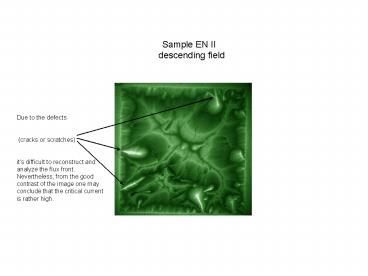Sample EN II PowerPoint PPT Presentation
Title: Sample EN II
1
Sample EN II descending field
Due to the defects (cracks or scratches)
its difficult to reconstruct and analyze the
flux front. Nevertheless, from the good contrast
of the image one may conclude that the critical
current is rather high.
2
Sample FN 06
T 70 K B 0.1 mT
Despite irregular geometrical shapes and
defects (scratches) in the film, one can clearly
distinguish regions with different critical
currents (blue line points at the region with jc1
the orange ones to jc2)
a)
b)
c)
separated by bright d-lines. Furthermore, the
critical current in the SC on a bare substrate
have pronounced anisotropy, which is manifested
by easy flux propagation in vertical direction.
e)
d)
T 4 K a) B 0.1 mT b) B 3.4 mT c) B 21
mT (a-c ascending field) d) B 13 mT
(descending field) e) B 0 mT (remanent state)
3
Sample FN 16
This sample, apparently, has suffered a
substantial degradation, especially, in the YSZ
part (octagonal), which has collapsed into a
number of grains. Still, a profound anisotropy in
the bare part is clear from the shape of the
flux penetration in vertical direction the front
propagates relatively easy and looks like a
number of bright lines (due to weaker currents in
horizontal direction through a set of intrinsic
weak links).
a)
b)
c)
T 4 K a) B 0.1 mT b) B 3.4 mT c) B
17 mT
4
Sample FN 16
This sample also has a rather high critical
current, which may be concluded from a very good
contrast of MO images. That is despite numerous
puncture-like defects, which may be seen as
parabolic features on the flux front and pores in
major parts of the film (appearing as irregular
bright features on the flux front).
a)
b)
c)
e)
d)
T 4 K a) B 4 mT b) B 17 mT c) B 85 mT
(a-c ascending field) d) B 43 mT (descending
field) e) B 0 mT (remanent state)
PowerShow.com is a leading presentation sharing website. It has millions of presentations already uploaded and available with 1,000s more being uploaded by its users every day. Whatever your area of interest, here you’ll be able to find and view presentations you’ll love and possibly download. And, best of all, it is completely free and easy to use.
You might even have a presentation you’d like to share with others. If so, just upload it to PowerShow.com. We’ll convert it to an HTML5 slideshow that includes all the media types you’ve already added: audio, video, music, pictures, animations and transition effects. Then you can share it with your target audience as well as PowerShow.com’s millions of monthly visitors. And, again, it’s all free.
About the Developers
PowerShow.com is brought to you by CrystalGraphics, the award-winning developer and market-leading publisher of rich-media enhancement products for presentations. Our product offerings include millions of PowerPoint templates, diagrams, animated 3D characters and more.

